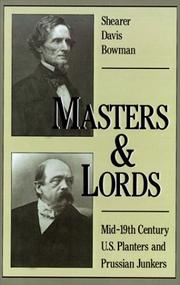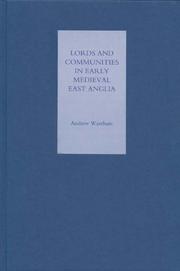| Listing 1 - 3 of 3 |
Sort by
|

ISBN: 1280440236 142940549X 0195363949 1601296851 9781429405492 9781601296856 9781280440236 9786610440238 6610440239 0195052811 9780195052817 0197714609 Year: 2023 Publisher: New York ; Oxford University Press,
Abstract | Keywords | Export | Availability | Bookmark
 Loading...
Loading...Choose an application
- Reference Manager
- EndNote
- RefWorks (Direct export to RefWorks)
This sweeping study presents a comparative view of large planters in the antebellum American South before the US Civil War and the Junkers of East Prussia during the same period.
Plantation life --- Plantation owners --- Nobility --- Noble class --- Noble families --- Nobles (Social class) --- Peerage --- Upper class --- Aristocracy (Social class) --- Titles of honor and nobility --- Owners of plantations --- Planters (Persons) --- Landowners --- Slaveholders --- History --- Southern States --- Prussia, East (Poland and Russia) --- History.

ISBN: 1282080873 9786612080876 1846154103 1843831554 Year: 2023 Publisher: Woodbridge, Suffolk : The Boydell Press,
Abstract | Keywords | Export | Availability | Bookmark
 Loading...
Loading...Choose an application
- Reference Manager
- EndNote
- RefWorks (Direct export to RefWorks)
This text is an investigation of the changing power structures of the English aristocracy in medieval England. The author uses the organization of the aristocracy in East Anglia as a case study to explore the issue.
Nobility --- Human ecology --- Social ecology --- Social groups --- Cities and towns, Medieval --- History --- East Anglia (England) --- Politics and government --- Medieval cities and towns --- Association --- Group dynamics --- Groups, Social --- Associations, institutions, etc. --- Social participation --- Ecology, Social --- Environment, Human --- Human ecology (Social sciences) --- Human environment --- Social sciences --- Ecology --- Human beings --- Ecological engineering --- Human geography --- Nature --- Noble class --- Noble families --- Nobles (Social class) --- Peerage --- Upper class --- Aristocracy (Social class) --- Titles of honor and nobility --- Social aspects --- Effect of environment on --- Effect of human beings on --- East Anglia. --- European aristocracy. --- Kinship ties. --- Local power. --- Social mobility. --- Social structure
Book
ISBN: 9780674290150 0674290151 Year: 2023 Publisher: Cambridge (Massachusetts) London Harvard University Press. The I Tatti Renaissance Library
Abstract | Keywords | Export | Availability | Bookmark
 Loading...
Loading...Choose an application
- Reference Manager
- EndNote
- RefWorks (Direct export to RefWorks)
"The works for which Paolo Giovio is best known today are his two volumes of Elogia: one concerning notable literati (1546), the other surveying prominent military and political figures (1551). The first of these, entitled Portraits of Learned Men (Elogia veris clarorum virorum imaginibus), is here newly edited and translated. Taken as a whole, Portraits of Learned Men provides an insightful synopsis of the contours, mentality, and trajectory of humanistic culture in Italy and Europe from the fourteenth to the mid-sixteenth century. As he watched the foreign invasions of the Italian peninsula and the conquests that ensued, Giovio came to believe that the high culture of the Italian Renaissance-in which he had participated not only in Rome but in Florence, Milan, Naples, and elsewhere-was in rapid decline, a perspective he had voiced nearly two decades before in Notable Men and Women. We may view the Portraits as a mature and more systematic effort than that dialogue to capture and commemorate a bygone period of efflorescence. Unlike others' catalogues, however, Giovio's Portraits of Learned Men was but an offshoot of a far more ambitious project of commemoration. At least since 1521, he had been collecting likenesses of learned men, and the following year he began procuring portraits of outstanding rulers and men of arms. Tireless in supplicating potential patrons, he rapidly expanded his collection, and in 1537 he began construction on the southwest shore of Lake Como of a villa custom-made to display what he called his musaeum (literally, a "home of the Muses," but here carrying something resembling the modern sense of "museum"). Initially, he had planned just to identify the subjects in brief; but in perhaps his most creative move, he decided to enlarge the inscriptions to the point that they became biographical sketches, many of them several hundred words in length. Few of the biographical sketches in Portraits of Learned Men are eulogies; many verge on character assassination. Most lie in between, mixing praise and blame in a way that resembles the oratorical genre of epideictic favored by humanists in their sermons before the popes. Giovio sought to impart an appreciation for each man as a flesh-and-blood human being whose foibles were integral to making him who he was, and who, each in his own distinct way, contributed to making the Republic of Letters what it was. Viewed collectively, these capsule biographies (as the Latin elogia may best be rendered) can be seen to trace the arc of the development of learned culture in the Renaissance"--
Authors --- Scholars --- Nobility --- Renaissance --- Revival of letters --- Civilization --- History, Modern --- Civilization, Medieval --- Civilization, Modern --- Humanism --- Middle Ages --- Noble class --- Noble families --- Nobles (Social class) --- Peerage --- Upper class --- Aristocracy (Social class) --- Titles of honor and nobility --- Persons --- Learning and scholarship --- Writers --- Litterateurs --- Bio-bibliography --- Literature --- History --- Italy --- Italia --- Italian Republic (1946- ) --- Italianska republika --- Italʹi︠a︡nskai︠a︡ Rėspublika --- Italie --- Italien --- Italii︠a︡ --- Italii︠a︡ Respublikasi --- Italiĭsʹka Respublika --- Itālija --- Itālijas Republika --- Italijos Respublika --- Italikē Dēmokratia --- Īṭāliyā --- Italiya Respublikasi --- It'allia --- It'allia Konghwaguk --- İtalya --- İtalya Cumhuriyeti --- Iṭalyah --- Iṭalye --- Itaria --- Itaria Kyōwakoku --- Jumhūrīyah al-Īṭālīyah --- Kgl. Italienische Regierung --- Königliche Italienische Regierung --- Laško --- Lýðveldið Ítalía --- Olasz Köztársaság --- Olaszország --- Regno d'Italia (1861-1946) --- Repubblica italiana (1946- ) --- Republiḳah ha-Iṭalḳit --- Włochy --- Yidali --- Yidali Gongheguo --- Ιταλική Δημοκρατία --- Ιταλία --- Итальянская Республика --- Италианска република --- Италия --- Италия Республикаси --- Італьянская Рэспубліка --- Італія --- Італійська Республіка --- איטאליע --- איטליה --- רפובליקה האיטלקית --- إيطاليا --- جمهورية الإيطالية --- イタリア --- イタリア共和国 --- 意大利 --- 意大利共和国 --- 이탈리아 --- 이탈리아 공화국 --- Sardinia (Italy) --- History of civilization --- humanism --- biographies [literary works] --- scholars
| Listing 1 - 3 of 3 |
Sort by
|

 Search
Search Feedback
Feedback About
About Help
Help News
News